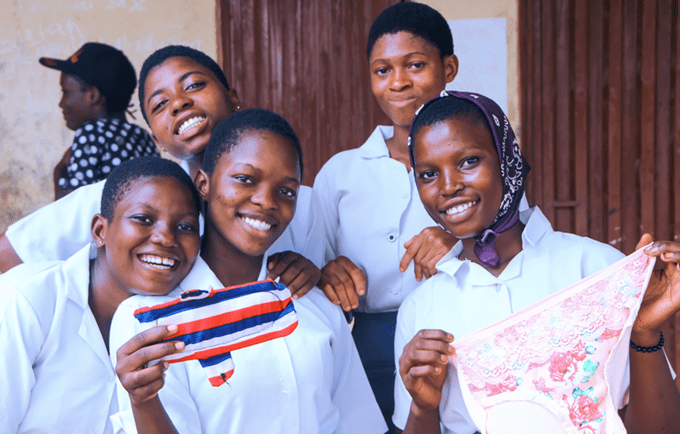Background
The issue of period poverty in Zimbabwe, Africa is a pressing and complex matter that has significant implications for the well-being and dignity of girls in rural areas. The scarcity of adequate menstrual products, coupled with a lack of education and awareness about menstrual health, has created a situation where many girls are forced to miss school, experience social stigma and shame, and suffer from a range of health problems. In this article, I will explore the problems and solutions of menstrual hygiene products regarding girls in rural areas (Zimbabwe), the link between menstrual health and sustainability, and discuss how promoting sustainable menstrual options can benefit both individuals and the planet.
As an observer of this issue while living in Zimbabwe before migrating to the UK and Australia, I witnessed firsthand the devastating effects of period poverty on girls’ lives and futures. One potential solution to this problem is using eco-reusable pads, which offer a sustainable and cost-effective alternative to disposable menstrual products. These pads are washable and can be reused multiple times, making them an ideal solution for girls who lack access to adequate menstrual products. By promoting the use of eco-reusable pads, we can help empower girls to take control of their menstrual health and well-being while also promoting sustainability and environmental responsibility.
Menstrual Health and Sustainability
The link between menstrual health and sustainability is a crucial issue that demands our attention and action. Disposable menstrual products are often made with plastic and other non-biodegradable materials that can take hundreds of years to decompose, harming the environment, contributing to waste, the degradation of the natural environment, and the depletion of our natural resources. By promoting sustainable menstrual options, we can help reduce our environmental impact and create a more sustainable future for ourselves and future generations. By raising awareness about this issue and advocating for sustainable menstrual options, we can help to create a more just, equitable, and sustainable world for all.
Taboos and the Lack of Menstrual Hygiene Products
It is abundantly clear that the issue of period poverty in Zimbabwe has significant implications for the well-being and dignity of young women in rural areas. Even though many girls are forced to miss school due to the scarcity of adequate menstrual products, coupled with a lack of education and awareness about menstrual health, they face social stigma and shame, as well as a range of health problems.
According to recent statistics by Zimbabwe Education Facts Sheets 2021, UNICEF Data, 11% of children aged between 15 and 17 have not completed primary education, an infringement of Sustainable Development Goal 4, “Quality Education.” Furthermore, using unhygienic materials like newspapers or leaves can cause infections and other health problems, which is a clear challenge to Sustainable Development Goal 3, “Good Health and Well-being.” By promoting the use of menstrual hygiene products, we can help empower girls in rural areas to take control of their menstrual health and well-being while promoting sustainability and environmental responsibility. Therefore, we must take action to address this issue and ensure that girls in rural areas have access to adequate menstrual products and education. Moreover, the cultural taboo surrounding menstruation in certain communities, coupled with the limited access to menstrual hygiene products, creates a complex issue that has a profound impact on the health, education, and social well-being of girls in rural Zimbabwe.
The ramifications of this issue are multifaceted, as girls who miss school during their periods can fall behind in their studies. In turn, this can limit their opportunities for future education and employment. Furthermore, the cultural taboo surrounding menstruation can lead to girls being ostracized and excluded from social activities during their periods, which can have a detrimental effect on their mental health and social development. Consequently, providing access to menstrual hygiene products and education is crucial for promoting gender equality and ensuring that girls have the resources and education they need to achieve their full potential.
Solutions to Period Poverty and Sustainability
Many solutions can be implemented to address the different challenges faced by girls in rural areas of Zimbabwe who lack access to menstrual hygiene products. One such solution is the provision of affordable menstrual hygiene products, such as “eco-reusable” pads, which are low-cost, sustainable, and more hygienic than traditional menstrual hygiene products. Unlike disposable sanitary pads, eco-reusable pads are often made from natural and breathable materials such as cotton, which can provide a more comfortable wearing experience. They significantly allow better air circulation, reducing the likelihood of irritation or discomfort. On the other hand, disposable pads are made from synthetic materials that may not allow for as much breathability. Therefore, this can sometimes lead to a feeling of dampness or discomfort.
Additionally, education and awareness are critical solutions to menstrual health poverty. By providing education and awareness about menstruation, we can reduce stigma and increase understanding of the importance of menstrual hygiene in rural areas.
Another key solution is the implementation of empowerment programs, such as Pen Pal or other programs that focus on empowering girls. These programs can help boost confidence, independence, and the ability of girls to manage their periods effectively, thereby promoting gender equality and supporting young women and girls in reaching their full potential. Generally, addressing the challenges faced by girls in rural areas in Zimbabwe who have no access to menstrual hygiene products requires a multifaceted approach that involves education, community engagement, and access to affordable products and sanitation facilities.
Eco-Reusable Menstrual Hygiene Products
Nonetheless, introducing Eco-Reusable pads is a sovereign solution for a greener future and for eliminating poverty whilst also advancing UNICEF’s agenda of Education and other Sustainable Development Goals. Menstruation is a natural and normal process that affects millions of people worldwide. The problem with disposable menstrual products is that their production and disposal can have negative impacts on the environment (Sustainable Development Goals 6, 12, 13, 14, and 15) and human health. This can harm wildlife and ecosystems.
Additionally, according to Time Magazine, Health and Well-being 2023, the production and disposal of disposable menstrual products can lead to negative health impacts, such as exposure to harmful chemicals and toxins. Sustainable menstrual options such as Eco-Reusable pads are alternative options that can promote better menstrual health and reduce waste. Eco-reusable pads are made with natural and biodegradable materials, such as cotton and bamboo, that can be washed and reused for multiple cycles. This also supports local businesses and communities. The benefits of more sustainable menstruation products are that they are more affordable and accessible for individuals, particularly those in low-income or rural communities.
Conclusion
The lack of access to menstrual hygiene products and education is a complex issue that has far-reaching consequences for girls in rural Zimbabwe. The cultural taboo surrounding menstruation, coupled with limited access to resources, can lead to missed opportunities for education and employment, health problems, and social exclusion. However, there are a number of solutions that can be implemented to address this issue, including the provision of affordable menstrual hygiene products, education and awareness campaigns, and empowerment programs. By working together to support girls in Zimbabwe, we can promote gender equality and help ensure that every girl has the resources and education she needs to achieve her full potential.
 Tafadzwa Ashely Gore is an extraordinary 17-year-old author and environmental activist. Her achievements and dedication to making a positive impact are incredibly inspiring. From being recognized as one of the 50 Science Innovators in the UK by the AFS Global Scholars 2023 program to her collaboration with UNICEF to improve menstrual health in rural Zimbabwe, Tafadzwa’s work is making a real difference. Her Eco-Sanitary Menstrual Hygiene Products project showcases her innovative thinking and compassion for addressing menstrual poverty in an eco-friendly way. Not only is she an accomplished author with her book Unsaid and has co-authored two other books, but she also used global platforms to advocate for sustainability and environmental issues. Tafadzwa’s dedication, passion, and innovative thinking are remarkable.
Tafadzwa Ashely Gore is an extraordinary 17-year-old author and environmental activist. Her achievements and dedication to making a positive impact are incredibly inspiring. From being recognized as one of the 50 Science Innovators in the UK by the AFS Global Scholars 2023 program to her collaboration with UNICEF to improve menstrual health in rural Zimbabwe, Tafadzwa’s work is making a real difference. Her Eco-Sanitary Menstrual Hygiene Products project showcases her innovative thinking and compassion for addressing menstrual poverty in an eco-friendly way. Not only is she an accomplished author with her book Unsaid and has co-authored two other books, but she also used global platforms to advocate for sustainability and environmental issues. Tafadzwa’s dedication, passion, and innovative thinking are remarkable.
The MAHB Blog is a venture of the Millennium Alliance for Humanity and the Biosphere. Questions should be directed to joan@mahbonline.org
The views and opinions expressed through the MAHB Website are those of the contributing authors and do not necessarily reflect an official position of the MAHB. The MAHB aims to share a range of perspectives and welcomes the discussions that they prompt.
